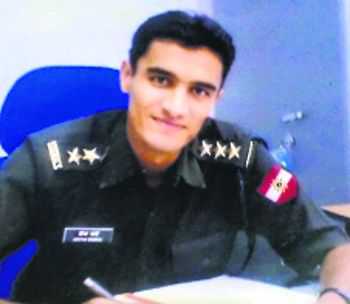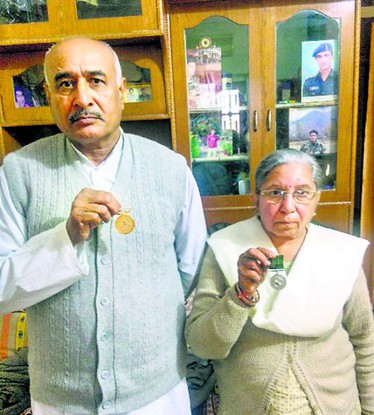

Indu Sharma and Naresh Sharma proudly display the Kirti Chakra awarded to their son Capt Deepak Sharma.
Col Dilbag Dabas (Retd)
Deepak, son of Naresh Sharma, was born in Bidhlan village of Sonepat district on July 3, 1983. He grew up listening to the stories of valour of his grandfather, who was part of the action during World War II, and at a very young age, decided to follow into his footsteps.
Deepak passed his senior secondary education from Shiksha Bharti School, Rohtak. After attaining a Bachelor of Technology degree from Maharishi Dayanand University, he joined the Officer’s Training Academy, Chennai, and was commissioned into the Signal Regiment on September 16, 2006. In March 2008, Deepak, as a young Captain, was sent on two-year attachment with 42 Rashtriya Rifles (Assam) operating in Pulwama district of Jammu and Kashmir.
Pulwama district, located between the Pir Panjal Range and the Greater Himalayas, though geographically not close to the line of control (LoC) in the west, has the dubious distinction of being one of the hotbeds of militancy in the Kashmir valley. And it is strongly believed that due to a false notion of being alienated by the state, Kashmiri youths have covertly been assisting militants exported by Pakistan. Nonetheless, 42 Rashtriya Rifles has an impressive record of conducting many successful cordon and search operations in the Kashmir valley from time to time since its deployment there. During one such counter-militancy operation in Pulwama district, Captain Deepak Sharma, an officer from the Signal Regiment attached to 42 Rashtriya Rifles (RR) Battalion, displayed gallantry of the highest order, for which he was awarded the coveted Kirti Chakra, the second highest peace-time military decoration in the country. The account of gallantry of Captain Deepak Sharma during a counter-militancy operation in the Kashmir valley is recorded in the War Diary of 42 RR Battalion.
Naresh Sharma, a retired banker, recalls, “During his B Tech final semester, Deepak was offered a well-paid job in an upscale corporate house but for his love for the Army, he declined the offer. I asked him as to what special was he looking for being an Army officer? He told me ‘papa, Army mein mujhe salute milegi, samman milega aur sahi maine mein desh sewa ka mauka milega’. His reply really made me proud”.
During his short leave in January 2010, Deepak got engaged to a serving lady officer from the Signal Regiment itself at a simple ceremony and the marriage was scheduled sometime in June the same year. But no one knew he had a different kind of date with fate three months before that.
Indu Sharma, mother of Capt Deepak Sharma, opens up with a sigh, “Every mother’s son has a date with fate. My son too had his but he met his date with fate as a warrior, as a ‘shoorveer’, in the finest traditions of the Indian Army”.
The account of his bravery in War Diary of 42 RR Battalion reads…
On March 4, 2010, some terrorists were suspected to be hiding in a room in a village in Pulwama district of Jammu and Kashmir, which could not be cleared due to its close proximity to a large Jamia Masjid. Since the targeted room was adjacent to the masjid, and to avoid any damage to it, direct room intervention was the only option to flush out the militants. At 8.15 am, on March 4, Capt Deepak Sharma along with his buddy closed in and entered the house through a small window by lobbing hand grenades. At point-blank range, Capt Sharma fired and killed one terrorist in the first room. He then crawled to the next room under heavy volume of fire from the terrorists and lobbed another grenade. On spotting two terrorists under the staircase, with total disregard to own safety, Capt Sharma charged at them with a steely grit and killed both of them on the spot. However, during the fire fight, Capt Deepak Sharma sustained a gunshot wound on his neck and he later succumbed to his injuries. Captain Deepak Sharma displayed unflinching devotion to duty and indomitable courage in the face of the enemy and made the supreme sacrifice in the finest traditions of the Indian Army.
(The writer is a veteran Gunner, 6 Field Regiment)
